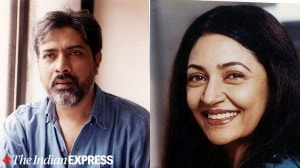A Whole New Ball Game
They’ve just won the first international tournament in 28 years. They’ve got a new, professional kit. And, with a bit of luck, the...

They’ve just won the first international tournament in 28 years. They’ve got a new, professional kit. And, with a bit of luck, they will be staying in three or four-star hotels.
You could say things have changed for Indian football since Stephen Constantine took over as the national coach. The real difference, however, lies not in trophies and kit-bags but in the intangibles; in attitude, confidence levels, aggression. In the extra crunch of a sliding tackle, the sprint in a winger’s feet.
After a lifetime spent travelling the globe, from New York to Nepal and Cyprus in between, Constantine faces perhaps his toughest challenge yet: dragging Indian football, kicking and screaming, from obscurity to a semblance of decency. All the while, a host of critics — bitterly opposed to foreign coaches — line up to wait for the fall.
And the former England under-18 coach, two months into this job, is champing at the bit. He knows expectations are high, as will be the price of failure. ‘‘Former players and coaches sat on their performances and never really did anything concrete to improve the standard. What they did 40 years ago is totally irrelevant today. One should look ahead, not into the past’’, he feels.
How different is he to other foreign coaches? ‘‘They took their job as a profession.
|
The foreign hand: From 1964 till date HARRY WRIGHT: The first foreigner to coach India for the 1964 Asia Cup where India finished runners-up to Israel. India had a reasonably good record before finally going down to Israel in the final. With the Englishman at the helm, India also played two games against Iran in the 1964 Olympic qualifiers but lost both their matches (0-3 at Tehran, 1-4 at Calcutta). JOZSEF GELEI: After trying and testing the home-bred coaches, the AIFF decided to bring this former Hungarian (1966 World Cup) goalkeeper. But it proved to be a futile exercise as the results didn’t show any improvement. Story continues below this ad JIRI PESEK: A member of the 1954 World Cup squad, the Czech took over in 1991. Still there was no improvement. His only achievement was the SAARC title at Lahore in 1993. In the Nehru Cup that year, India could not win a single game. RUSTOM AKRAMOV: After he guided Uzbekistan to their maiden at Hiroshima Asian Games in 1994, India roped him in to perform the miracle. But, like his predeccesors, the Uzbek didn’t have much to offer except a SAF Games gold in 1995 at Chennai. In the SAARC tournament that followed at Lahore India lost to unheralded Sri Lanka in the semi-finals. IVO SAJIH-SCHEICH: This pony-tailed coach didn’t last long. In charge of the Youth Development Programme, Ivo was sacked following the debacle of the u-23 squad at the Rajiv Gandhi International Tournament at Margao in 1998. India finished last in the three-team event, conceding 10 goals in two matches! ISLAM AKHMEDOV: Recommended by Akramov, he was recruited for the Youth Development Programme. Promoted as coach last year, he came a cropper in the Millennium Cup where India failed miserably. Currently in charge of the u-17, u-19 teams, Akhmedov has helped the former qualify for the Asia Cup final to be played at Dubai early next month. AminuI Islam Story continues below this ad |
For me, it’s a way of life. Had I been a rich man, I would have trained any club, any country free of cost because I love football and want to develop it as my career.’’ He comes with impressive enough credentials. In Nepal, he was a national hero after his team won the silver medal at the South Asian Games, when they weren’t even expected to qualify. That brought him the country’s highest civilian honour, after he wooed the crowds by appearing at big matches in Nepalese dress.
His arrival in India has rekindled the passion and confidence in the players. Today, Indian players are more aggressive and dynamic in their approach than they were, thanks to Constantine’s broadened outlook. Though he exclaims ‘‘nobody tried to drill it into their head’’, the Londoner has been successful in being able to explain the significance of the killer instinct in modern football to his new wards.
Unless a team has a killer instinct, he believes, it cannot succeed in international competition. ‘‘This is what I call the nasty style of soccer. There is no fault with Indian players; they can play an attacking game. It’s the coaches who never taught them how to go for the kill. Losing 0-2 or 1-2 was always considered an achievement. It’s amazing.’’
Killer instinct is a quality whose importance shouldn’t be underestimated. When he first took charge of the South Korean team, Guus Hiddink would despair at one common trait: every time one of his players tackled an opponent, or beat him for speed, he would run back and apologise. He tackled the problem head-on and reaped the rewards two months ago.
It’s worked so far for Constantine, too, the juniors coming back from two goals down to beat the senior Vietnam team in the final of the LG Cup. This was a revelation to the many — including the footballers — who were convinced that India could not win matches. ‘‘This was lacking so far. Now, the confidence level has really improved; the players know what I want, what I expect and, above all, what they can do’’, he says.
‘‘He wants us to play rough and tough. My brief association with the coach has made me understand what killer instinct is all about’’, says Abhishek Yadav, who scored the match-winner in the final. Constantine, he feels, would probably pick a less skillful player over one low on aggression.
Before the players went to Vietnam, they played a match against a team of veterans in Kolkata. ‘‘There was no quarter given or taken’’, says one of the players. ‘‘He told us to play that same brand of football. Indian coaches might advise players to take things lightly against weaker rivals. But this man said nothing doing’’.
It’s a toughness that spreads to team discipline. Yadav recalls how a senior player who didn’t toe the coach’s line during the camp was made to realise his mistake. ‘‘Coach did not say anything to the particular senior during the camp. He just left him out of the team.’’
There was a time when Constantine would keep Arsene Wenger’s autobiography close to his heart; the Englishman modelled himself on a professor, as does Wenger, than a football coach. Actually, coaching isn’t a profession for him, more a way of life. The fun factor is clear from Constantine’s ‘active’ coaching: unlike other Indian coaches, he plays with the boys, not merely shout instructions from the sidelines.
Bhaichung Bhutia, one of India’s most celebrated strikers, couldn’t agree more. ‘‘Working with him has been a fantastic experience. My fitness levels have gone up and I’m feeling more confident than I was even a year ago.’’ Fitness has been another main issue for Constantine. Yadav says the team played few matches during the Jamshedpur camp. ‘‘Most of our routine included building fitness levels. He (coach) never compromised on this. Indian coaches might think at one stage ‘enough is enough’, but for Constantine the full stop comes much later in the book.’’
|
The batch of ‘74 INDIA’s best performance came in 1974 when they jointly won the Asian Youth Championship in Bangkok after the final against Iran ended in a 2-2 draw. Led by Shabbir Ali, the team had players of great calibre who achieved stardom with the senior national side. Vice-captain Prasun Banerjee, Dilip Palit, Chinmoy Chatterjee, Lateefuddin and the late Harjinder Singh are some of the names who left an indelible mark with their performance in the tournament. Story continues below this ad Under Ali, who later became one of the best strikers and coach, India defeated Burma, Hong Kong and Laos in their group. Ali scored in the team’s wins over Burma and Laos in all crucial games. In the quarter-finals against Singapore, India won 4-1 in tie-breaker after the match had ended in a 1-1 draw. Ali rose to the occasion again and scored in India’s 2-1 victory over Thailand in the semi-finals. In the final against Iran, the Indian skipper maintained his goal-scoring spree, scoring once while the other scorer was Lateefuddin. Aminul Islam |
And the apparent lack of fixed tactics hasn’t hurt the team much: India scored 11 goals (three by Bhutia) in the LG Cup and got at least 30 chances. ‘‘Earlier, too, our coaches tried different formations but things went wrong in the implementation stage’’, the Indian skipper added.
Maybe it’s a simple replacement of blackboard by brainpower. Constantine, feels former skipper Jo Paul Ancheri, can read a player quickly and accurately. ‘‘He can judge a player’s strengths and weaknesses, and then put the player in a position that suits him. For example, in Vietnam, the coach always preferred to use Yadav, a rookie striker, as a substitute. And the Mahindra player scored every time he came on as a replacement.’’
Indeed, Yadav may well be considered the find of the tournament, and is proof of the coach’s willingness to eschew the safe path for one offering greater risks and rewards. ‘‘He’s highly positive, a motivator par excellence,’’ he says. ‘‘He taught us the finer points of the game with the help of his massive stock of videos. It was a new experience.’’
It’s the human touch, something missing in Indian coaches, that could be the key to Constantine’s success. Once off the field, Constantine sheds his dictator’s garb. ‘‘He’s like a friend to us. We talk about everything under the sun with him, which has helped the bonds grow stronger’’, says Yadav.
He’s also aware of the importance of pride and self-belief, and keeps reminding his players that they are part of a national team. With that comes certain privileges, and he’s fought for those too. Not satisfied with the usual hotel in Old Delhi, he’s fighting to get the team booked into a four-star hotel. ‘‘The team didn’t have a proper kit, I had to fight for that. You can’t ignore the players’ interests, especially when they are playing for their country.’’
The ride ahead will be bumpy. Constantine is his own man, and won’t have it any other way. He showed it by choosing a team for Vietnam that had 10 uncapped players. Now, he’s ruffled the feathers of the venerable Maidan clubs by proposing to the All-India Football Federation that senior players be kept for national duty. Also, he says, there are too many tournaments and feels there should be a reduction on the matches played every year.
Others before him have tried, but failed. But there’s something about Constantine — maybe the brutal honesty, which comes out in his expletive-heavy speech — that makes you think he just might pull it off. His philosophy is simple: If you want something, go get it. Indian football may have kicked off the most important game in its life.
(With Dharmendra Jore)
Photos



- 01
- 02
- 03
- 04
- 05




























